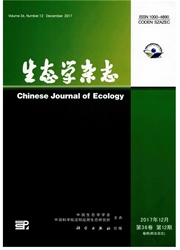

 中文摘要:
中文摘要:
为明确生物炭对东北粳稻苗期的生长发育和对育苗基质营养含量的影响、探明生物炭在东北冷凉地区水稻育苗生产上的应用潜力,以东北稻田土壤为基础、生物炭为外源添加物(5.0%~20.0%,w/w),研究生物炭对东北冷凉区水稻秧苗株高、干物质积累量、矿质元素N、C、S、P、K、Mn、Zn、Cu、Fe、Mg、Ca和Na的吸收及育苗基质中矿物质元素含量变化的影响。结果表明:在育苗基质中添加生物炭对水稻苗期株高、干物质积累有显著影响;其中施用5.0%、10.0%和15.0%生物炭时株高分别比对照平均提高1.2%、5.0%和6.0%,干物质积累量分别比对照平均提高18.2%、27.7%和43.4%;水稻秧苗随着生物炭施用量增加,N、C、S、P、K、Mn、Ca、Na、Mg、Zn、Cu和Fe吸收量均呈先升后降趋势;在施炭量为5.0%时矿物质元素Mn、Zn和Cu出现峰值,在施炭量为10.0%时矿物质元素Fe出现峰值,在施炭量为15.0%时矿物质元素N、C、S、P、K、Ca、Na和Mg出现峰值;在育苗基质中,N、C、S、P、Zn、Cu、Mg和Na含量随生物炭用量增加均呈上升趋势,而K和Fe随生物炭量增加,其含量逐渐减少,Mn和Ca含量无明显规律性变化;在育苗基质中施用10.0%~15.0%的生物炭能够促进水稻秧苗生长,有利于水稻秧苗对大部分矿物质元素的吸收与利用,同时提高育苗基质固定与保持一些重要营养元素的能力。
 英文摘要:
英文摘要:
Effects of biochar on growth and development of japonica rice seedlings and nutrient contents of substrate soil in northeastern China were ascertained to verify the application potential of biochar in rice seedling production in northeastern China cold region. On the basis of the conventional paddy soil in northeastern China with exogenous additions of biochar (5.0%-20.0%, w/w), effects of biochar on plant height, dry matter accumulation, the uptake of mineral elements (N, C, S, P, K, Mn, Zn, Cu, Fe, Mg, Ca and Na) of rice seedlings and the change of mineral element contents in substrate soil were studied in northeastern China cold area. It was found that biochar addition had remarkable effects on plant height, dry matter accumulation of rice seedlings. Plant height of rice seedlings increased by 1.2%, 5.0% and 6.0% while dry matter accumulation increased by 18.2%, 27.7% and 43.4% compared with those of the control respectively when 5.0%, 10.0% and 15.0% of biochar were applied in substrate soil. With the increase of biochar addition, uptakes of N, C, S, P, K, Mn, Ca, Na, Mg, Zn, Cu and Fe of rice seedlings presented a similar trend of first ascending and later descending. When the biochar application rate was 5.0%, the contents of mineral elements Mn, Zn and Cu arrived at the peak. When the biochar application rate was 10.0%, the content of mineral element Fe reached the peak. When the biochar application rate was 15.0%, the contents of mineral elements N, C, S, P, K, Ca, Na and Mg reached the peak. N, C, S, P, Zn, Cu, Mg and Na contents in nursery substrates all increased with the increase of biochar application. However, K and Fe contents decreased gradually, and Mn and Ca contents had no obvious change with the increase of biochar application. The results suggested that the application of biochar in the nursery substrates by 10.0%-15.0% could promote the growth of rice seedlings, the absorption and utilization of most mineral elements by rice seedlings, and the ability of immobilizing and
 同期刊论文项目
同期刊论文项目
 同项目期刊论文
同项目期刊论文
 期刊信息
期刊信息
